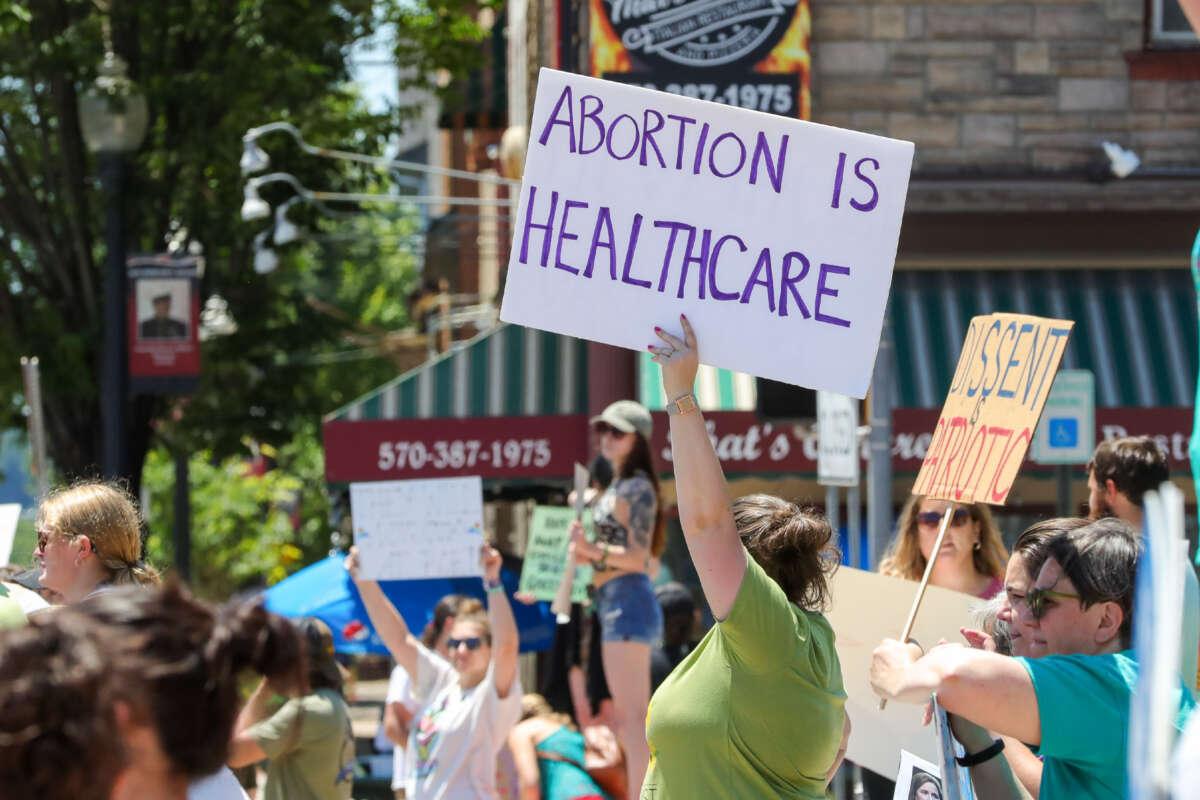Truthout is a vital news source and a living history of political struggle. If you think our work is valuable, support us with a donation of any size.
The Pennsylvania State Supreme Court issued a ruling on Monday that may pave the way to undoing a 42-year-old state law that forbids the state’s Medicaid program from funding abortion care.
In a 3-2 decision by the court, the justices ruled that a lower court had to re-examine the legality of the 1982 Abortion Control Act, which only allows state Medicaid funds to pay for abortions in cases of rape, incest and when it is deemed necessary to save the life of a pregnant person. The lower court had initially stated that it wouldn’t rule on whether the law was congruent with the state constitution.
Abortion in Pennsylvania is currently recognized as a right up to 23 weeks of pregnancy, with limited exceptions allowed after that point. But for those who are on the state Medicaid program, called Medical Assistance, abortions are not paid for, and must be paid out of pocket by recipients because of the Abortion Care Act. Plaintiffs in the case, represented by the Women’s Law Project, said the state’s refusal to pay for abortions but willingness to provide other reproductive options within Medical Assistance amounted to sex discrimination.
Federal law prohibits the use of federal dollars to provide abortion coverage to those who are part of the Medicaid program. However, states can add additional funds to their programs themselves in order to provide that coverage, which 17 states currently do.
Two of the state Supreme Court justices indicated that abortion is a fundamental right under the state constitution. A third justice called their analysis an “incredibly insightful” opinion, but stopped short of endorsing it, noting that the case before them didn’t require an answer on that question.
Still, the majority opinion, which now forces the lower court to consider the law’s application and its constitutionality, leaves little doubt that it could be upended sometime in the future.
“The right to reproductive autonomy is the right to self-determination. While the right has been presented to us in terms of making the decision ‘to choose to end or continue a pregnancy,’ it implicates the broader proposition that individuals have the right to make important reproductive healthcare decisions — a gender neutral right to make decisions without governmental intrusion into those private matters that play a defining role in the course of a lifetime,” the court said in its ruling. “Our Constitution guarantees equality in the exercise of this right. The right of all individuals to be left alone to pursue happiness and enjoy liberty is central to our compact with the government.”
The lower court will now re-examine the legality of the law. Abortion rights activists lauded the ruling, describing it as the next step toward ensuring that Medical Assistance participants can obtain the procedure.
“Even though a majority of the Court didn’t hold there is a fundamental right to abortion in Pennsylvania, this issue will come back to the Court in the future, and we now have a great building block to accomplish that goal,” said David S. Cohen, constitutional law professor at Drexel Kline School of Law.
“The rights of Pennsylvanians are due to all Pennsylvanians, not just those wealthy enough to afford them…. Today’s ruling is the first step toward ending discriminatory access to care, and we remain committed to removing every barrier to abortion,” said Signe Espinoza, executive director of Planned Parenthood PA Advocates.
Women’s Law Project co-executive director Susan J. Frietsche also weighed in on the ruling from the Pennsylvania Supreme Court.
“The Court gave our clients an enormous victory,” Frietsche said in a press release. “We are still determining next steps, but we are confident the Medicaid abortion ban will be consigned to the scrapheap of history very soon.”
A terrifying moment. We appeal for your support.
In the last weeks, we have witnessed an authoritarian assault on communities in Minnesota and across the nation.
The need for truthful, grassroots reporting is urgent at this cataclysmic historical moment. Yet, Trump-aligned billionaires and other allies have taken over many legacy media outlets — the culmination of a decades-long campaign to place control of the narrative into the hands of the political right.
We refuse to let Trump’s blatant propaganda machine go unchecked. Untethered to corporate ownership or advertisers, Truthout remains fearless in our reporting and our determination to use journalism as a tool for justice.
But we need your help just to fund our basic expenses. Over 80 percent of Truthout’s funding comes from small individual donations from our community of readers, and over a third of our total budget is supported by recurring monthly donors.
Truthout has launched a fundraiser to add 379 new monthly donors in the next 6 days. Whether you can make a small monthly donation or a larger one-time gift, Truthout only works with your support.
